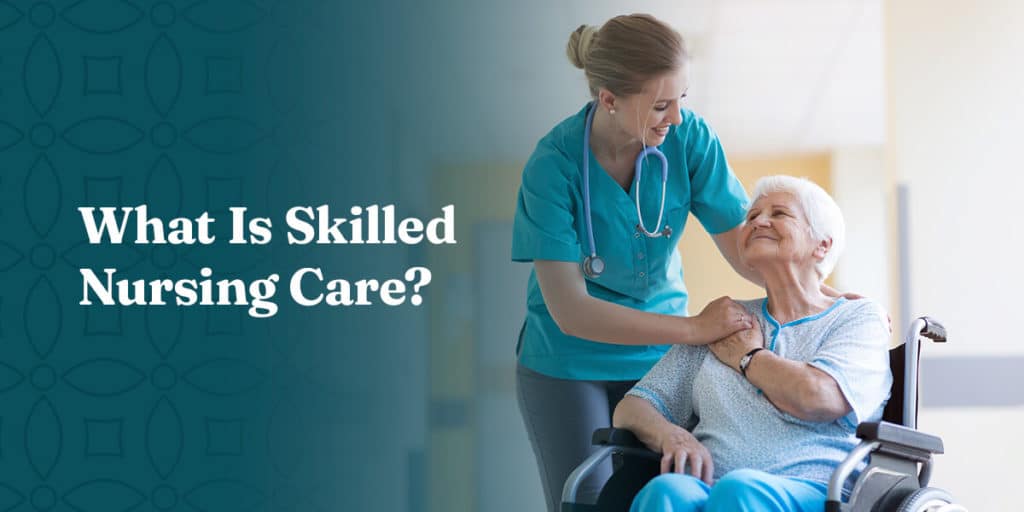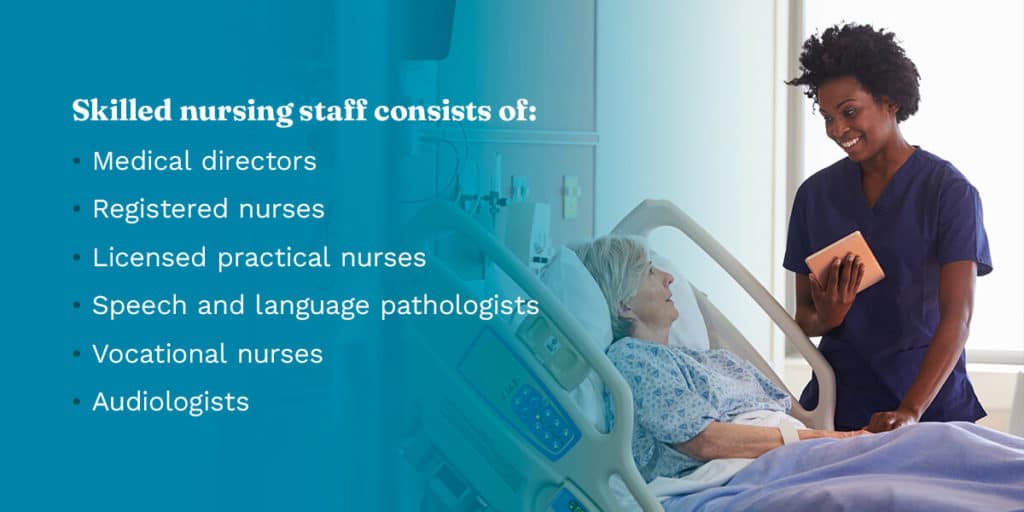What Is Skilled Nursing Care?


When most people think of the term “skilled nursing,” they usually have conflicting ideas of what it entails. When considering options for care, skilled care may be recommended and not all providers or communities are able to offer this level of care.
Skilled nursing refers to medical care that is provided by or under the supervision of a licensed health professional, such as registered nurses, occupational, physical and speech therapists. Usually, skilled health care is offered in skilled nursing facilities, rehabs, long term care facilities or the home with at least one physician that oversees patients’ care.
Skilled nursing facilities must meet specific criteria while being periodically inspected for high-quality standards.

What Are Examples of Skilled Nursing Care?
If your family member has had surgery or extensive treatment for health conditions, they might require skilled nursing care following their release from the hospital. For instance, if your older family member has had a stroke or has a disability, they’ll typically require extended rehabilitation services that only certified nurses can provide.
The care provided in a skilled nursing facility is more complex and intense in nature and the patients need a this care on a frequent or consistent basis due to a chronic medical condition.
Examples of skilled nursing care include:
- Physical therapy: After an illness, surgery or specific injuries, physical therapy is prescribed to patients to restore function and mobility, and minimize pain. Physical therapists will use manual therapy methods such as exercise, massage and stretching, to improve the alignment and flexibility of bones and soft tissues.
- Occupational therapy: This is a form of therapy is performed by a licensed occupational therapist, with a focus on helping the patient become more independent in performing their activities of daily living after an illness or injury. While physical therapy focuses on the functioning of the body, occupational therapy focuses on the actual activity you need or want to perform every day.
- Speech therapy: Performed by speech and language pathologists, speech therapy focuses on improving a patient’s language, communication, swallowing and fluence after an illness or injury. Speech therapists provide treatment for patients with aphasia, cognitive-linguistic impairments, dysphasia and other swallowing disorders.
Skilled nursing staff consists of:
- Medical Doctors
- Registered nurses
- Licensed practical nurses
- Speech and language pathologists
- Physical therapists
- Audiologists
- Social workers
- Nursing assistants
- Nutritionists
What Qualifies a Patient for Skilled Nursing Care?
To qualify for skilled nursing care, a physician will need to determine that you require daily skilled care provided by a skilled healthcare professional.
Overall, skilled services are necessary at a higher frequency in high-intensive settings, meaning treatment at home or intermediate care facilities isn’t applicable. These services also involve a personalized plan and goal-setting to improve your family member’s functionality or medical condition in a set timeframe.
Your family member should exhibit health conditions that require services that meet the following criteria:
- Services needed at a high frequency or intensity: Typically, your family member will need around-the-clock care for health issues that can only be cared for in skilled medical facilities such as a disability, severe injury and post-surgery care.
- Services need to be monitored weekly: Your family member will require skilled nursing for daily specialty treatment that will need to be evaluated weekly for improvement.
For an extended stay in a skilled nursing facility, your family member must display a measurable and significant improvement from therapy that healthcare workers will evaluate weekly. Examples of professional nursing services that meet the requirement are tube-feeding, IV injections, colostomy care and urinary catheter care.
What Is the Difference Between Home Health and Skilled Nursing?
Skilled nursing can be provided in a facility or in a the home by a Medicare approved home health care agency. While both services offer highly skilled care, some skilled nursing care is better managed in a facility versus a home based setting. Additional differences include insurance coverage, frequency of the services and the ability of the professional providing the care.
1. Patients
Patients who require skilled nursing will usually need close monitoring and extensive care. This can be provided in a nursing facility or at home with home health care. However, some patients require nursing staff to be present at all times, around the clock and this is not provided by home health care. Additionally, some home health care agencies are not able to provide the frequency that a nursing facility can provide. Some patients requiring skilled services will need to be evaluated daily in an intensive skilled nursing facility and may transition into home care when they’re physically able.
2. Services
Skilled nursing typically involves medically-related health services such as administering medication through injection, wound and pain management or rehabilitation equipment for physical therapy. Home health care agencies can provide skilled nursing services, but may not be able to cover or manager certain complex chronic conditions which require frequent monitoring and multiple professionals involved.
3. Care Providers
For skilled nursing, registered nurses are usually assigned to ensure your family member is given the medical care they need at precise times of the day. Professional providers such as different therapists will also be involved in their care. Home health agencies may not have the range of specialists and providers that a facility has and therefore may not be able to provide that provider in to you in your home.
4. Insurance Coverage
Skilled nursing care is typically covered under Medicaid, Medicare or private insurance. However, this coverage is often limited in duration. Examples of criteria that need to be met include:
- Experiencing functional decline: Rehabilitative therapies are intended to treat a recently documented decline in your family member’s functional performance due to illness, injury, disease or surgery.
- Meets minimum assistance requirements: As an example, according to BlueCross BlueShield policies, skilled rehabilitation services are applicable when your family member requires two examples of assistance — bed mobility, transfers and ambulation or wheelchair use for up to 70 feet.
- A high enough frequency of care is needed: For most insurers, your family members can receive skilled nursing care when they require rehabilitation for at least one hour a day, five days a week.
- Expected to improve: Your family member can receive coverage for skilled nursing services if they’re expected to get better in a reasonable timeframe.

Learn More About Corewood Care
When you have a family member who requires home health services, trust Corewood Care in Maryland, North Virginia, or Washington D.C. If you have an aging parent who needs to be transitioned into at-home care, we provide ADL services and guidance throughout the process.
We specialize in elder care and provide around-the-clock services to support your family when you need it the most. Learn more about Corewood Care today.



